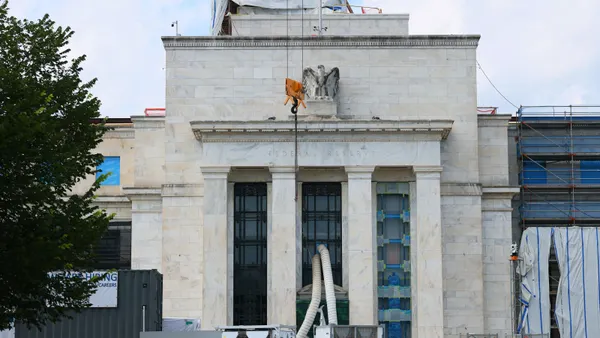UPDATE: Jan. 24, 2020: Presidential candidate Sen. Elizabeth Warren sent letters this week to the CEOs of the nation's eight systemically important financial institutions.
“To protect themselves and the economy from climate-driven catastrophes, large financial institutions must act quickly to address risks,” she wrote to top executives at JPMorgan Chase, Bank of America, Citigroup, Wells Fargo, Goldman Sachs, Morgan Stanley, Bank of New York Mellon and State Street. “I write to ask for more information about the risks caused by the climate crisis on the financial industry and your institution’s practices, including what steps, if any, your institution is taking to adapt to mitigate these risks."
Warren seeks written responses by Feb. 7. She co-sponsored a bill introduced in November that would force the Federal Reserve to conduct stress tests every two years to measure large banks’ ability to weather financial risks brought on by climate change.
Since that time, Goldman Sachs pledged to target $750 billion over the next 10 years for "climate transition and inclusive growth finance," the bank's CEO, David Solomon wrote in a Financial Times op-ed.
Dive Brief:
-
A Senate bill introduced Wednesday would force the Federal Reserve to conduct stress tests every two years to measure large banks’ ability to weather financial risks brought on by climate change.
-
The Climate Change Financial Risk Act of 2019 would put the U.S. on par with such countries as the U.K. and the Netherlands, whose central banks have started quantifying the potentially systemic risks associated with climate change, said Sen. Brian Schatz, D-HI, the bill’s sponsor.
-
Nine Democratic senators, including five presidential candidates, have expressed their support for the measure, but the bill still needs support from Republicans, who hold a majority in the Senate.
Dive Insight:
The Fed tests whether banks hold enough of a capital buffer to offset adverse hypothetical economic situations such as a spike in unemployment. But it doesn't do the same for climate.
World economies could lose at least $44 trillion in economic activity by 2060 with 2.5 degrees of warming, or as much as $72 trillion by 2060 in the event of climate inaction, Citigroup predicted.
Under the bill, a group of climate scientists and economists convened by the Fed would create three stress-test scenarios: one in which the temperature rises 1.5 degrees Celsius; another that boosts the temperature 2 degrees; and a "business-as-usual" scenario, which assumes a higher level of warming based on current climate policies.
Tests would be limited to financial institutions with more than $250 billion in total consolidated assets — the same banks that are subject to Comprehensive Capital Analysis and Review stress tests.
Banks would be required to create and update a plan to limit the financial impacts of future climate risks. Once the tests are complete, the Fed can object to any climate risk capital plan it deems unreasonable or ineffective. The institution will not be able to proceed with capital distributions until the objection is lifted.
"While our federal regulators are legally obligated to manage and reduce risks in the financial system, they have been ignoring the growing financial risks of climate change," Schatz said in a statement. "This bill will push the Fed to do their job and start taking climate risk seriously."
The Fed signaled this month that it may incorporate climate change risk into its assessments of financial stability, and may even take it into account when setting monetary policy.
Rep. Sean Casten, D-IL, has introduced companion legislation in the House.











